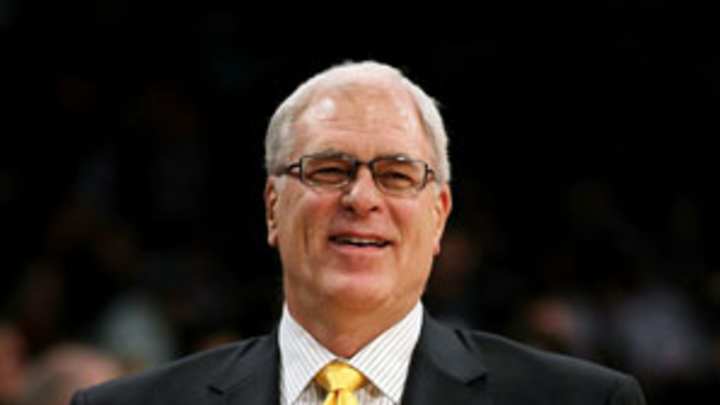Lakers, Jackson ramping up effort to oppose Kings' relocation

The Kings are likely headed for Anaheim, with the Maloof family that owns the team eager to leave its small-market struggles behind and tap into the Southern California market, the second largest in the country. It is a reality that has finally been accepted by the locals, a development so heartbreaking and harrowing that they're left longing for hope in any form.
Even if it comes courtesy of Public Enemy No. 1: Lakers coach Phil Jackson.
In a twist that is thick with irony and breaks every rivalry rule ever written, it appears the Lakers and their oft-despised coach might offer the best chance for Sacramento to keep its Kings. And with the rumblings growing louder that Lakers owner Jerry Buss is ramping up his behind-the-scenes effort to rally support against the move, Jackson played the part of public spokesman yet again on Wednesday in a way that should surely make up for the time he once infamously called Sacramento a "cow town."
After saying on March 26 that having a third team in the market would be "ridiculous," Jackson expounded on his views in an interview with SI.com.
"I don't see any community, I don't care if it's Bombay with 25 million [people], being able to support three teams [in the same market]," Jackson said before the Lakers fell to Golden State in what was their third straight loss. "I know Istanbul does it with three soccer teams, and England does it in London with three soccer teams in the surrounding area, but it makes it very difficult in our community and our television area to do that kind of a thing. It will hurt all the franchises."
The operative word there being "television." The Lakers recently signed a deal with Time Warner that a source with a vested interest in knowing the terms insists is worth $5 billion over 25 years (conceivably $200 million annually). The agreement has previously been reported as a 20-year, $3 billion deal, but that figure has been refuted by involved parties.
According to a recent ESPN.com report, the Lakers stand to lose 10 percent of the deal should the Kings move to Anaheim. Given the 25-year, $5 billion figure, then, the two-time defending champions would have 500 million reasons to oppose this particular relocation.
The Maloofs, who sources say have a deal with Comcast that is currently worth about $11 million annually, are looking at the television component as a major reason for the move. The Lakers' deal with Time Warner, which starts after next season, leaves a major void for Fox Sports West that the Kings could potentially fill. The Clippers, by comparison, have a deal with the regional network that a source with knowledge of those terms said is worth approximately $22.5 million annually but could be up for renegotiation in light of the team's rising popularity and the emergence of rookie forward Blake Griffin.
Yet when the Maloofs make their pitch to the league's Board of Governors at the April 14-15 meetings in New York with the hopes of filing for relocation before the April 18 deadline, they may face more resistance than expected. And while the notion of reaching the necessary majority vote against seems far-fetched, the "nay" crowd led by Buss and Clippers owner Donald Sterling may at least be able to exact its pound of financial flesh before the moving vans roll into Sacramento. That penance paid would come in the form of the negotiable relocation fee, which was $30 million when the Seattle SuperSonics moved to Oklahoma City but could certainly be significantly more because of the drastically different circumstances.
Beyond the money matters, though, Jackson said the league should be concerned about the precedent the Maloofs would be setting.
"It's small markets vs. large markets," he said. "Are the large markets willing to have another team move in and share their community? Chicago, New York City? [New York] is going to have a Brooklyn franchise now (starting in the 2012-13 season) instead of New Jersey. So that's inside the subway system. Philadelphia, another major city, another sized city like that, or cities in big metropolitan areas. Dallas, Houston? So it has to affect the major cities that have a monopoly, the top 12 markets."
The Maloofs' long-term viability as owners is considered a factor by league officials and some owners, with the family's reported financial struggles at the Palms Casino & Hotel in Las Vegas and with the Kings at the root of the growing skepticism. The nature of the Kings' move itself has only fed that fire, as the Anaheim City Council recently approved $75 million in bonds that includes a $50 million loan from Anaheim Ducks owner Henry Samueli.
For Jackson's money (and the Lakers' moola, for that matter), the Maloofs would be better suited either finding a solution in Sacramento or heading to a less-crowded market.
"The [Kings'] fans, I think, were No. 1 in the league [in the early 2000s]," Jackson said. "And so it's really kind of disheartening to see a team that's played that well and a town that's supported it that well to not be able to continue, and to have to pull the plug or do whatever they might do come April as opposed to maybe going another direction."
